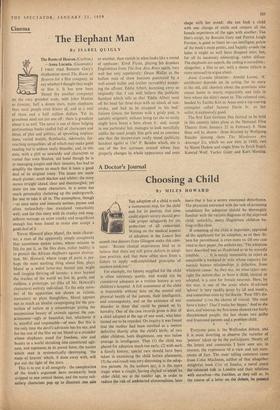Cinema
The Elephant Man
By ISABEL QUIGLY The Roots of Heaven.(Carlton.) —Anna Lucasta. (Gaumont.) I FIRST read Romain Gary's elephantine novel The Roots of Heaven for a film company, to say whether I thought they ought to film it. It has now been filmed (by another company) on the very grandest scale, with John Huston as director, half a dozen stars, more elephants than most people even dream of, and at a cost of three and a half million dollars. Yet its grandness need not put one off : there is grandeur about it as well. The novel is one of those bulging portmanteau books stuffed full of characters and ideas, of plot and politics, of sprawling implica- tions, varied worlds, flashbacks, sidetracks, far- reaching sympathies, all of which may make good reading but is seldom really filmable; and, in this case, with a plot so unwieldy and characters so varied that even Huston, old hand though he is at managing jungles and their inmates, has had to simplify the theme so much that it loses a good deal of its original irony. The issues are made much plainer, much blacker and whiter; the story moves straight ahead, clear and disentangled; yet there are too many characters, in a sense too much personality cluttering up the undergrowth, for one to take it all in. The atmosphere, though —at once noisy and intensely serious, joyous and often melancholy—has translated remarkably well; and for this story with its cranky and mag- nificent message an actor cranky and magnificent enough has been found to make one accept a good deal of it.
Trevor Howard plays Morel, the main charac- ter, a man of the apparently simple complexity that sometimes makes saints, whose mission in life (to put it, as the film does, rather baldly) is to protect the African elephants against destruc- tion. Mr. Howard, whose range of parts is per- haps the most startling thing about him, plays Morel as a weird latter-day hermit you might well imagine thriving off locusts : a man beyond the reaches of the world we live in, gentle and ruthless, a prototype, yet (like all Mr. Howard's characters) entirely individual. To the only mem- ber of his opposition not shown as vicious, mercenary or plain thoughtless, Morel appears not so much an idealist campaigning for the pro- tection of nature as a misanthrope pitting the unconscious beauty of animals against the con- sciousness—ugly or beautiful, but, whichever it is, mindful and responsible—of man. But this is the only time the devil's advocate has his say, and for the rest of the film we see Morel as a crusader whose elephants stand for freedom, size and beauty in a world shrinking into constricted ugli- ness, and represent, in its purest form, the nature which man is systematically destroying, 'the roots of heaven' which, if done away with, will put out the light of the stars.
This is to put it all meagrely : the complexities of the book's argument have necessarily been stripped to one central theme, and the many sub- sidiary characters pop up to illustrate one side or another, then vanish in what looks like a round of applause : Errol Flynn, playing his drunken Englishman from The Sun Also Rises again, very well but very repetitively; Orson Welles as the hollow man of show business punctured by a well-aimed bullet and (rather incredibly) accept- ing the affront; Eddie Albert, hamming away so inspiredly that I can well believe the publicity handout which tells us that 'Eddie Albert went off his head for three days with an attack of sun- stroke, and had to be strapped to his bed.' Juliette Greco, the heroine with a grisly past, is suitably enigmatic without being (as she so easily might have been) a bore about it : and, except in one particular hat, manages to look mercifully unlike the usual jungly film girls and to convince one that the temperature really stood (publicity handout again) at 136° F. Besides which, she is one of the few actresses around whose face properly changes its whole appearance and even shape with her mood : she can look a child with one change of smile and conjure all the female experience of the ages with another. The film's script, by Romain Gary and Patrick Leigh. Fermor, is good to listen to—an intelligent prdcis of the book's main points, and happily avoids the holes it might so well have dropped into; but, for all its necessary ,telescopiag, rather diffuse. The elephants are superb, the ending is incredible : altogether, a film to see, wits a theme (which is more unusual) to argue about.
Anna Lucasta (director : Arnold Laven; 'A' certificate) depends on its acting, for its story is the old, old chestnut about the prostitute who comes home to marry respectably and falls in love where she didn't mean to. The coloured cast, headed by Eartha Kitt as Anna and a rip-roaring youngster called Sammy Davis Jr. as her sailor, is explosively good.
The first East German film festival to be held in this country takes place at the National Film Theatre from January 21 to February 8. Nine films will be shown : three directed by Wolfgang Staudte (among them The Murderers Are Amongst Us, which we saw here in 1948), two by Staten Dudow and single films by Erich Engel, Konrad Wolf, Vaclav Gajer and Kurt Maetzig.










































 Previous page
Previous page